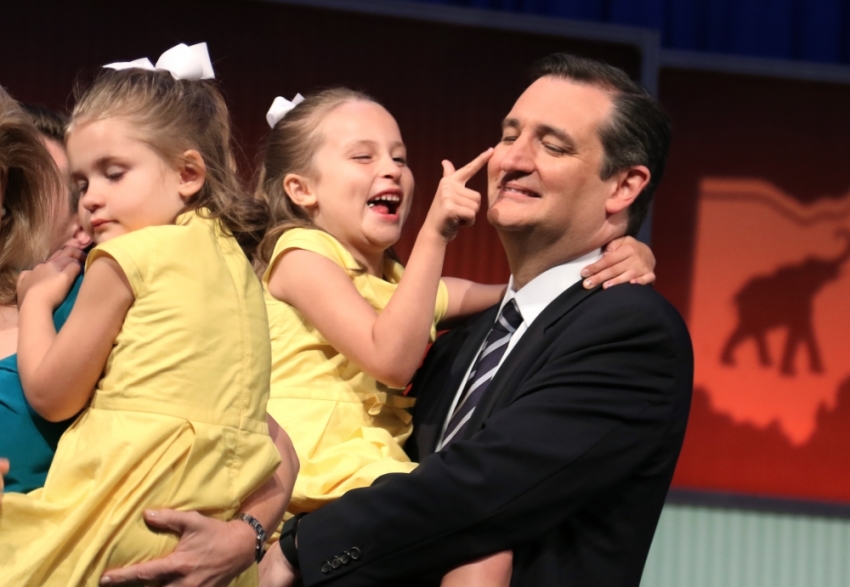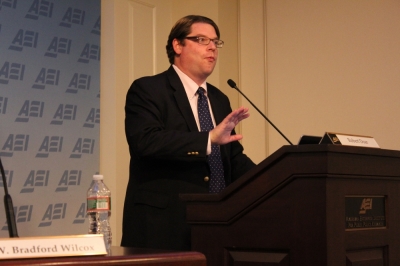Republicans More Happily Married Than Democrats, Sociologists Find

Republicans are more likely to be married, less likely to divorce, and are more likely to be happy in their marriage than Democrats, sociologists W. Bradford Wilcox and Nicholas Wolfinger have discovered.
Fifty-seven percent of Republicans are married, compared to 40 percent of Democrats; 41 percent of ever-married Republicans have been divorced, compared to 47 percent of ever-married Democrats; and, 67 percent of married Republicans say they are in "very happy" marriages, compared to 60 percent of married Democrats, they reported for Family Studies, the blog of the Institute for Family Studies.
The research looked at 20 to 60 year olds from 2010 to 2014 in the General Social Survey, one of the largest yearly surveys of Americans.

Wilcox and Wolfinger, co-authors of the forthcoming Soul Mates: Religion, Sex, Love, and Marriage among African Americans and Latinos, did the research in response to a July 15 Bloomberg View op-ed by Noah Smith, assistant professor of finance at Stony Brook University.
Smith argued that the sexual permissiveness and non-traditional gender roles of liberals made marriages stronger.
"What if sexual permissiveness and feminism, instead of being toxic to the institution of marriage, are the key to saving it?
"... If you wait until marriage to have sex, you're taking an enormous risk. What if you're not compatible? Or what if you regret not having shopped around?
"Sexual permissiveness means that sex isn't about marriage. But that means that marriage isn't about sex. Most of the upper-class liberal educated Americans I know who are in stable, happy marriages had their share of premarital sex. ...
"Feminism may be even more important for families. ... Feminism ... rewards fathers for sharing child care and housework, and frees them from the heavy burden of antiquated expectations.
"In other words, maybe liberal morality is simply better adapted for creating stable two-parent families in a post-industrialized world. Maybe conservative family values are hard but brittle, like diamond, while liberal family values are strong like titanium — able to bend without breaking," he wrote.
Wilcox and Wolfinger also conducted a multivariate analysis, to see if other factors could explain the partisan marital differences. Race and religiosity explained more than half of the difference, they discovered.
Republicans are more likely than Democrats to be white, and whites are more likely to be happily married, they found.
"This suggests one reason Republicans have happier marriages is that, as a party with a larger share of white couples, they are less likely to face the discrimination, segregation, and poverty that minority couples often experience in America, all of which can compromise the quality of married life," they wrote.
Also, Republicans have higher levels of religious service attendance and couples who attend services together are more likely to be happily married.
"That's because churchgoing couples enjoy more social, normative, and ritual support for their marriages and family lives," they wrote.
Still, race and religiosity could not explain all of the partisan differences, and some of the other usual suspects, such as socioeconomic status, did not account for any of the differences.
Wilcox and Wolfinger acknowledge that the path of causation is still unclear. Are Republicans more likely to get married or are the married more likely to be Republican?
"Perhaps Republicans are more optimistic, more charitable, or more inclined to look at their marriages through rose-colored glasses," they wrote.
But, at the very least, they found no evidence for Smith's contention that liberalism is the key to martial bliss.
W. Bradford Wilcox is director of the National Marriage Project at the University of Virginia, a senior fellow at the Institute for Family Studies, and a visiting scholar at the American Enterprise Institute. Nicholas H. Wolfinger is professor of Family and Consumer Studies and adjunct professor of sociology at the University of Utah.



























